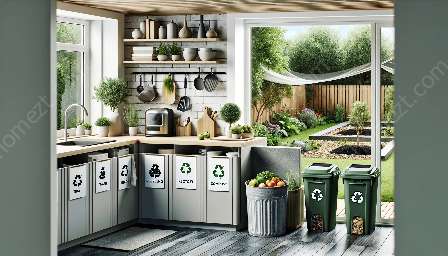Waste management in residential buildings is a critical aspect of maintaining a clean and healthy environment. Proper waste management techniques and home cleansing strategies play a crucial role in ensuring the well-being of residents and the sustainable management of waste. This topic cluster explores the significance of waste management systems in residential buildings, the proper waste management techniques, and home cleansing strategies.
The Importance of Waste Management Systems in Residential Buildings
Residential buildings generate a significant amount of waste on a daily basis. Without an efficient waste management system in place, this waste can contribute to environmental pollution, health hazards, and a decline in the overall quality of life for residents. Proper waste management not only helps in maintaining a clean and hygienic living environment but also promotes sustainability and environmental responsibility.
Key Components of Effective Waste Management Systems
An effective waste management system in residential buildings comprises several key components, including waste segregation, recycling initiatives, waste reduction strategies, and proper waste disposal methods. Waste segregation involves sorting different types of waste such as recyclables, organic waste, and non-recyclable materials at the source. Recycling initiatives aim to reprocess materials such as paper, plastic, glass, and metal to minimize the amount of waste sent to landfills. Waste reduction strategies focus on minimizing the generation of waste through conscious consumption and lifestyle choices. Proper waste disposal methods ensure that non-recyclable waste is disposed of safely and responsibly.
Proper Waste Management Techniques
Implementing proper waste management techniques in residential buildings involves the adoption of sustainable practices that help in reducing, reusing, and recycling waste. Residents can actively participate in waste management by segregating their household waste, composting organic materials, and reducing the consumption of single-use items. Additionally, the utilization of energy-efficient appliances and the promotion of eco-friendly habits contribute to minimizing waste generation and promoting a sustainable lifestyle.
Home Cleansing Techniques
In addition to waste management, maintaining a clean and organized home environment is essential for the well-being of residents. Home cleansing techniques encompass a range of practices such as regular cleaning, decluttering, and promoting a minimalist lifestyle. These techniques not only contribute to a visually appealing living space but also support better indoor air quality and a sense of overall well-being.
Effective Strategies for Better Waste Management and Home Cleansing
Combining proper waste management techniques with home cleansing strategies can yield significant benefits for residents. Educating residents about the importance of waste management and home cleansing, providing convenient and accessible waste disposal facilities within residential buildings, and incentivizing eco-friendly behaviors can foster a culture of environmental responsibility and cleanliness. Additionally, the implementation of community-wide waste management programs and awareness campaigns can further promote sustainable practices and a cleaner living environment.
Conclusion
Waste management systems in residential buildings, proper waste management techniques, and home cleansing strategies are interconnected aspects that contribute to a healthier and sustainable living environment. By implementing efficient waste management systems, adopting proper waste management techniques, and incorporating home cleansing practices, residents can actively contribute to a cleaner, greener, and more hygienic living space.


